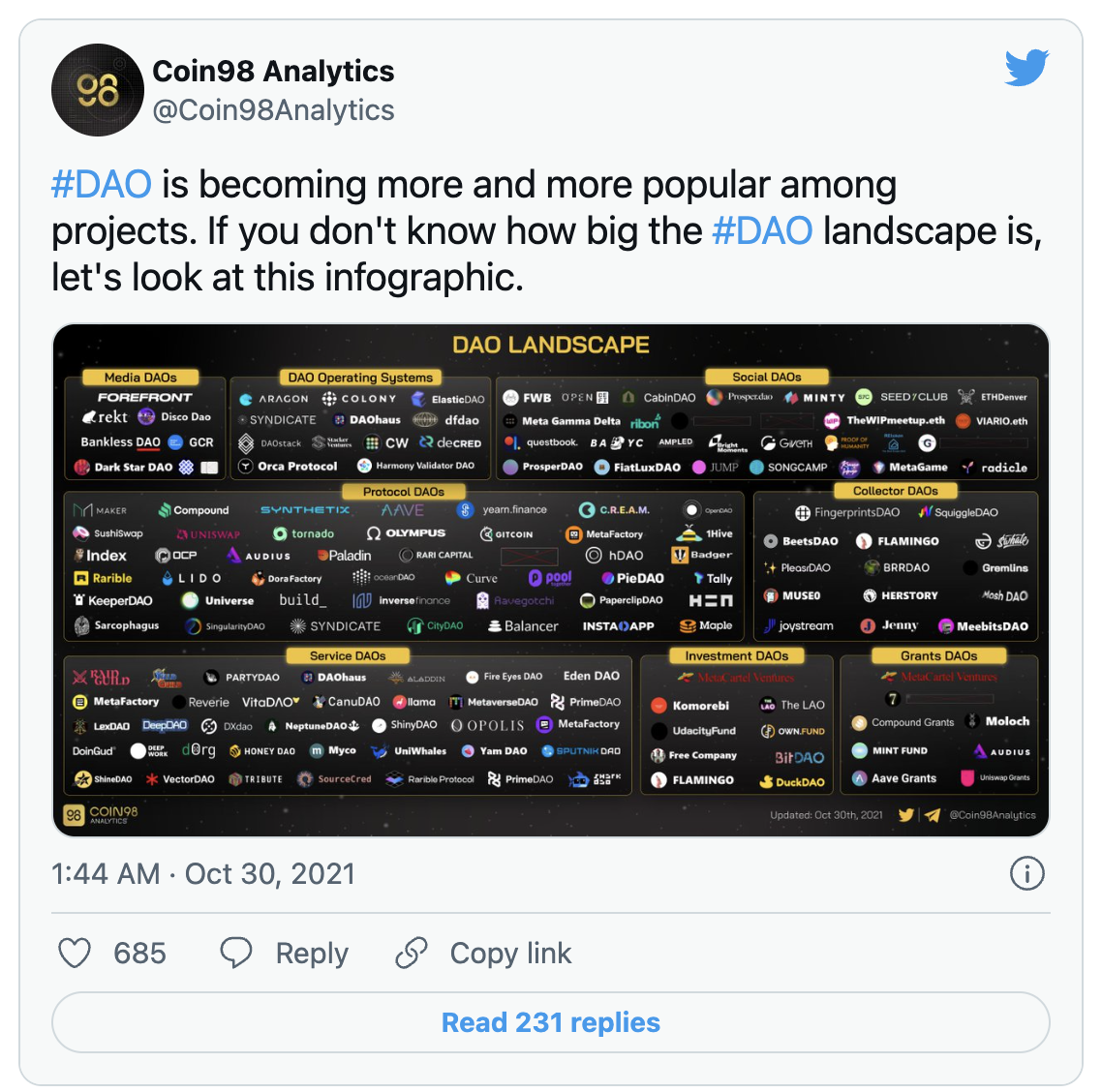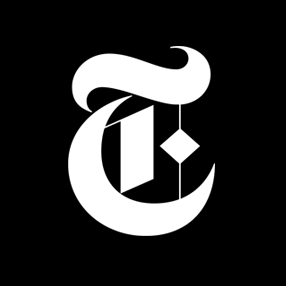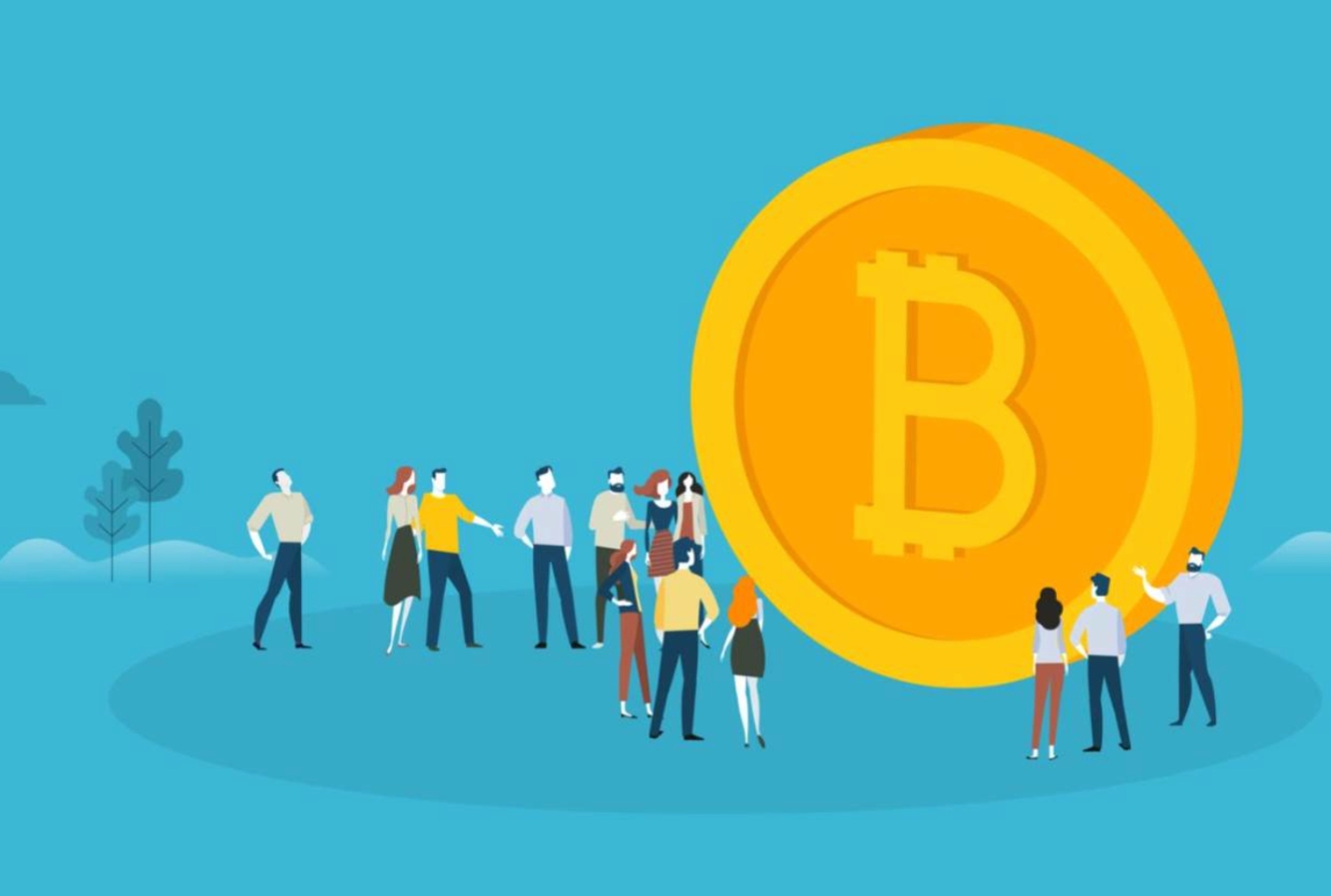The New York Times on DAO: When Reality Intrudes on the Vision of a Crypto Utopia
Authors: Eric Lipton & Ephrat Livni
Source: The New York Times
Compiled by: The Way of DeFi
American CryptoFed is a new type of organization born from the emergence of cryptocurrency— in some ways, it is not a company at all.
According to its established plan, American CryptoFed has no owners, managers, or employees. Instead, it is a "decentralized autonomous organization (DAO)" that is automatically controlled by computer code and governed by a user community voting on proposals.
For supporters, DAOs represent a new business model that can democratize commercial enterprises and break the control of large tech companies and other entrenched intermediaries over innovation in the information age. An increasing number of DAOs have already appeared online, such as those for financial services operations, news centers, and social clubs.
However, DAOs have also faced criticism from multiple angles, showcasing the disruptive innovative power of cryptocurrency while struggling to prove their practical utility beyond financial speculation.
DAO members have been engaged in ongoing debates about how to balance the demand for excellent management with the idealistic vision of collective decision-making. Crypto investors and regulators have stated that in some cases, these DAOs are equivalent to Ponzi schemes, aimed solely at boosting the value of associated digital tokens.
In organizations that do not adopt traditional business models and accounting practices, regulators are rapidly intervening out of concerns for investor protection.
The American CryptoFed DAO aimed to establish a cryptocurrency payment system, but just four months after its launch, it was ordered to shut down by the U.S. Securities and Exchange Commission (SEC) in November 2021. The SEC believed that the organization had "seriously misled" the public with contradictory documents that failed to disclose key information, such as audited financial statements.
SEC Commissioner Hester M. Peirce stated that the growth of DAO activities has been very rapid.
"The past year or so has been a significant period for DAOs, with a lot of experimentation happening," Peirce said. "It's hard to understand what this actually means because everything is moving so quickly."
Indeed, DAOs are grappling with various challenges, including massive financial losses due to software bugs and hacking attacks, internal divisions threatening the existence of certain entities, and allegations of misappropriation of community funds. For some DAOs, the issue of low voter turnout when voting on strategic or business decisions has remained unresolved, effectively leaving control in the hands of large investors who helped fund the DAO's launch.
This brewing chaos has sparked a debate: Are these DAOs tools for insiders to profit and exploit consumers, or are they early experiments conducted in a new business manner?
According to DeepDAO, in 2021, the value of cryptocurrencies held in the treasuries of over 4,000 DAOs grew by 3,200%, peaking at over $13 billion in December. Of course, these numbers fluctuate significantly with the value of cryptocurrencies.
DAOs have run various projects, including decentralized financial services like Compound and SushiSwap, investment pools like Red DAO (where fashion enthusiasts join to purchase digital collectibles), and social clubs like Friends with Benefits (where token holders meet virtually and in person).


The concept of DAOs has been embraced by individual crypto investors and industry giants alike, including Silicon Valley venture capital firm Andreessen Horowitz, which has billions of dollars to support blockchain projects. Industry lobbyists and lawyers, including those from A16z and American CryptoFed, have been working in Washington and state capitals to push for the recognition of DAOs and to revise what they call "outdated" laws.
Currently, federal regulators have almost no clear legal authority to regulate these entities unless a DAO is suspected of violating securities laws. SEC Commissioner Peirce stated that the result of regulators struggling to oversee new entities is chaos and ongoing conflict.
Perhaps the most promising yet concerning aspect of DAOs is the way they make decisions.
While DAOs can choose leadership groups or hire employees, theoretically, the primary decision-making power is left to the members, theoretically ensuring that the final decisions serve the majority of participants.
"Your virtual world" is the slogan of the virtual gaming space Decentraland. Like most DAOs, it relies on online voting to make decisions. Players can use tokens to purchase "land" or clothing and participate in virtual social activities with their avatars.
DeepDAO founder Eyal Eithcowich sees Decentraland and DXDAO as examples that come close to embodying the ideal DAO. Decentraland alone has conducted over 1,000 different votes on topics such as "Should wearable items, including guns, be allowed?"
"There have been internet forums in the past where you could debate and feel part of a community," Eithcowich said. "But here, you don't just get a sense of ownership. You actually own a part of the platform, and your vote has a direct impact on the platform. That's the beauty of it for me."
In fact, several large companies are also involved, such as JPMorgan, which opened a virtual space in Decentraland, a "lounge" to promote its Onyx payment network, featuring a digital portrait of its CEO Jamie Dimon.
However, the reality of setting up and running these DAOs is often complex.
OlympusDAO, which emerged a year ago, gained widespread attention and scrutiny for offering extremely high returns to cryptocurrency holders who submitted tokens to the system at specific times. It once offered annualized returns of nearly 8,000%.
The platform regularly holds online votes on proposals, such as a joint proposal with JonesDAO (a startup that allows users to invest in high-risk crypto derivatives and futures) in January.
But Olympus is largely controlled by its anonymous founder Zeus, whose statements about the business model have confused industry insiders. This has even led cryptocurrency enthusiasts to publicly question whether it might be a Ponzi scheme, relying entirely on the continued belief of participants and the inflow of cryptocurrency to sustain it.
Jordi Alexander, an executive at digital asset trading firm Selini Capital, stated that because there is no requirement for disclosure like that of publicly traded companies or private companies raising public funds, people know very little about OlympusDAO. "No one will ultimately audit it to ensure these statements are true," he elaborated in an article detailing his concerns about Olympus.
After reaching a high of about $1,400, an Olympus token is now worth only about $30, with the project's market cap losing nearly $4 billion. (A person claiming to be Zeus defended the project in an interview, stating that he was just trying to act authentically and honestly.)
Community conflicts have also led to a price crash for Wonderland DAO, whose founder was recently forced to disclose the true identity of the platform's financial officer, Sifu, as Michael Patryn. Patryn had previously been convicted of financial crimes in the U.S. and Canada and was a co-founder of the now-defunct Canadian cryptocurrency exchange QuadrigaCX.
The mysterious death of another QuadrigaCX co-founder raised suspicions among law enforcement, and clients lost about $135 million in cryptocurrency.
Since then, one of the hot topics of debate on the Wonderland governance forum has been whether to dissolve the DAO or transform it into a more traditional entity by hiring "a professionally vetted team (including a chief financial officer, chief legal officer, and chief operating officer)."
Many of the issues arising with DAOs often stem from the anonymity associated with DAOs and cryptocurrencies.
This anonymity can undermine accountability and foster what critics say is abuse of power, such as in SushiSwap, where its creator (Chef Nomi) abruptly left the project, cashing out nearly $13 million worth of tokens amid infighting.
A developer named OxMaki, who was involved in creating SushiSwap, told The New York Times in a group chat that the advantages of DAOs—diversity and decentralization—have also proven to be their weaknesses.
"DAOs are made up of a wide variety of people from all over the world, with no relationships between the parties. Each group has different visions and directions. DAOs have never reached complete decisions internally. That's a mistake." He added that he had never personally met other members of the Sushi team.
American CryptoFed claims to be the first legally sanctioned DAO in the U.S. It is registered in Wyoming, which passed the first state law to formally recognize DAOs and exempt cryptocurrency tokens from state securities laws.
In September of last year, it notified the SEC that it would create two new cryptocurrencies for payments and governance within its internal economy, both of which would be distributed to the public before being bought and sold.
However, the SEC quickly acted in November to block its token issuance, claiming it was an illegal securities offering.
Fearing SEC enforcement jurisdiction, decentralized startups are increasingly turning to private equity funds for funding, selling large amounts of tokens to big investors. As a result, venture capital firms like A16z have ended up having a greater influence in decision-making in some cases.
Crypto industry analyst Ryan Watkins has stated that venture funds, founders, core team members, and other insiders controlled nearly 50% of the shares at the initial issuance of the token SOL on the Solana platform, giving them significant governance power in the DAO.
The typically low voter turnout among individual token holders exacerbates this internal issue, making it easy for big players to influence outcomes.
"The more concentrated the token supply, the bigger the problem. This raises the question: Is this really a DAO? Or is it just a place where the wealthy decide everything?"
Watkins noted that some DAOs have realized that operating a truly decentralized entity can be challenging and are forming leadership committees to oversee certain key operations, which resembles a more traditional corporate structure.
But this could also be a concerning issue. Last summer, the DAO of decentralized cryptocurrency exchange Uniswap voted to form and support a lobbying group called the DeFi Education Fund, but when this new group prematurely sold millions of dollars' worth of tokens before the promised time, it sparked strong backlash from the community.
Chris Blec, founder of the news site DeFi Watch, which is dedicated to promoting transparency in crypto, stated that insiders with large amounts of tokens, like the investment firm A16z, pushed for the proposal.
"Basically, they initiated the proposal and then voted it through, ultimately making it seem like a legitimate bribery fund for them. The whole thing was for their corporate interests."
A16z's lawyer Miles Jennings stated that concerns about internal control are reasonable.
"Reasonable suspicion is warranted. We are still in very early stages."
He added that venture capital firms based in the digital world are connected to the real world. "We need to comply with laws and regulations."










